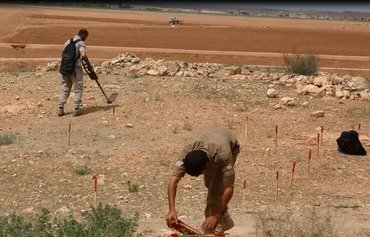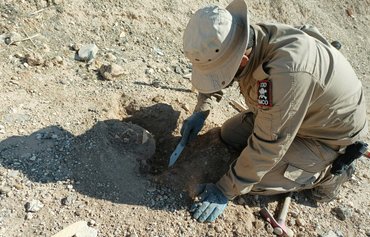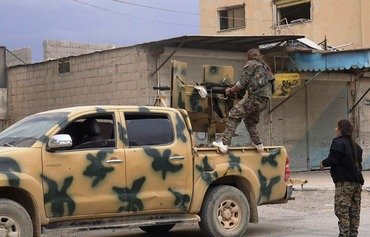Al-Tabqa Civil Council has been overseeing the effort to clear mines and explosive remnants of war planted by the "Islamic State of Iraq and Syria" (ISIS) from the areas it administers, local officials tell Diyaruna.
The internal security forces, the Syrian Democratic Forces (SDF) and specialised organisations have been working with the council to carry out the work, which began in residential areas and later extended to farms and agricultural areas.
Al-Tabqa native Mohammed al-Hamed, 60, told Diyaruna that the quick action of the internal security forces saved the lives of his family members.
Al-Hamed said he had decided to return to the agricultural land he owns near al-Tabqa after an absence of more than two years due to the security situation.
![Members of engineering teams affiliated with al-Tabqa Civil Council sweep areas in the vicinity of al-Tabqa in al-Raqa province to clear them of mines. [Photo courtesy of the Syrian Democratic Forces]](/cnmi_di/images/2017/09/22/9665-Tabqa-mine-field-600_384.jpg)
Members of engineering teams affiliated with al-Tabqa Civil Council sweep areas in the vicinity of al-Tabqa in al-Raqa province to clear them of mines. [Photo courtesy of the Syrian Democratic Forces]
Upon his arrival, he said, he noticed the land had been ploughed and the stones had been overturned, which was unusual, as his property had been neglected for a long period of time.
He thought it was possible that ISIS elements had dug up the ground and planted explosive devices, he said, so he contacted the internal security forces.
When they arrived at the scene, the internal security forces took a photo on a GPS-enabled phone and sent it to the mine removal team via the Telegram app.
"We did not have to wait long before the de-mining team patrol arrived, moved us away from the area and ordered us to head to the main road," he said.
The team uncovered more than 10 mines, which were difficult to spot as they were the same colour as the surrounding stones.
Each of them were connected to highly sensitive blasting caps that could detonate upon being moved or even touched, al-Hamed said.
"The team posted signs warning of the presence of mines, and asked me not to return until I had been informed that the mine sweeping and clearance process had been completed," he added.
Mine removal is a priority
"Mine clearance is a top priority for al-Tabqa Civil Council, because residents of the city and surrounding areas continue to suffer greatly from mines," said council deputy of the co-presidency Awas Khalil.
Many have been injured by mines ISIS planted inside homes, on agricultural lands and in and around government institutions such as water and electricity facilities and schools, he told Diyaruna.
"The council is co-ordinating with the internal security forces, the SDF and de-mining organisations to sweep the area for mines," he said.
The council also has appealed to local and international organisations to contribute to the effort of removing and dismantling mines, he said.
Those who have responded to the call include Roj Mine Control Organisation (RMCO), the Mines Advisory Group (MAG) and Tetra Tech, he said.
Each of these groups "has contributed to the removal and dismantling of mines, and has distributed warnings and notices to citizens instructing them to avoid and report mines to any security body", he said.
Close to 70 mines have been removed and dismantled from the local power transmission station, he said.
The council has been working to raise public awareness about mines and improvised explosive devices (IEDs) by distributing flyers and holding neighbourhood meetings, he said.
About 50 people, many of them children, have been killed by mines in the city of al-Tabqa alone, he added.
Efforts to safeguard civilians
Mine removal teams have been at work in al-Tabqa since the city was liberated from ISIS, said Mustapha Ceylan, who belongs to a de-mining team affiliated with the Kurdish People’s Protection Units (YPG).
The effort includes dismantling unexploded rockets and artillery and mortar shells, which pose a great danger as they can explode at any moment and for any reason, such as when there is a rise in temperature, he told Diyaruna.
"Teams specialised in dealing with mines and hazardous waste are deployed throughout the region," he said.
These include SDF teams and local organisations that have received support and training from specialised international organisations, Ceylan said.
All parties work in co-operation with al-Tabqa Civil Council, according to a plan that includes both response to reported sightings and pre-planned mine clearance operations in areas already identified as dangerous.
The work began with clearing mines from private homes, continued with main roads and public facilities such as schools and hospitals, and is now focused on ensuring farms and agricultural areas are free of explosives, he said.
Public awareness initiatives stress the need for people to exercise caution in the area and refrain from touching suspicious objects or going to and moving around in areas that have yet to be swept, he said.
People have been warned to stay out of areas that have been designated as dangerous, where signs warn of the presence of mines.
Residents can report mines
Ceylan urged residents to report mines or suspicious objects through the @Atlas03 Telegram account, which has been designated for this purpose.
Residents are asked to send a photograph of the suspicious object and provide the exact location of the site using a GPS, he said.
"As soon as security teams receive the report, they head to the area to investigate, then contact the engineering teams," he said, adding that "the location is marked, warning signs are posted and sometimes a checkpoint is set up to prevent casualties".
"This method is very effective, saves time and identifies the exact location of the object, especially seeing as the agricultural area is vast and contains dozens of towns, villages and farms," he said.
"Without this method, an error can be made in identifying the location and the intervention of the specialised teams can be delayed," Ceylan said.
"Residents have been advised to use only main roads and those used by the SDF, and avoid using side and agricultural roads -- at least until the engineering teams complete their sweep and ensure they are clear of explosives," he added.
Ceylan said there are many types of mines, including pressure-activated anti-personnel mines that can result in the amputation of lower limbs, and anti-armour mines which also are pressure activated.
Other varieties include wirelessly detonated and vibration activated mines.
"ISIS was adept at manufacturing its own mines and IEDs in its own workshops, and they are often shaped like rocks or boulders, and are sometimes placed in large vessels and buried underground," he said.
It appears that the mines were planted to harm civilians, he said, as there is no indication they have been planted in preparation for military confrontation.
More than 20,000 mines have been removed from the al-Tabqa area so far, he said, with 100,000 mines removed from parts of northern Syria liberated from ISIS, along with 2,000 explosive remnants of war and 4,000 booby traps.

![A mine-disposal specialist dismantles 'Islamic State of Iraq and Syria' mines in the northern Syrian city of al-Tabqa. [Photo courtesy of the Syrian Democratic Forces]](/cnmi_di/images/2017/09/22/9663-Syria-Tabqa-mines-600_384.jpg)






